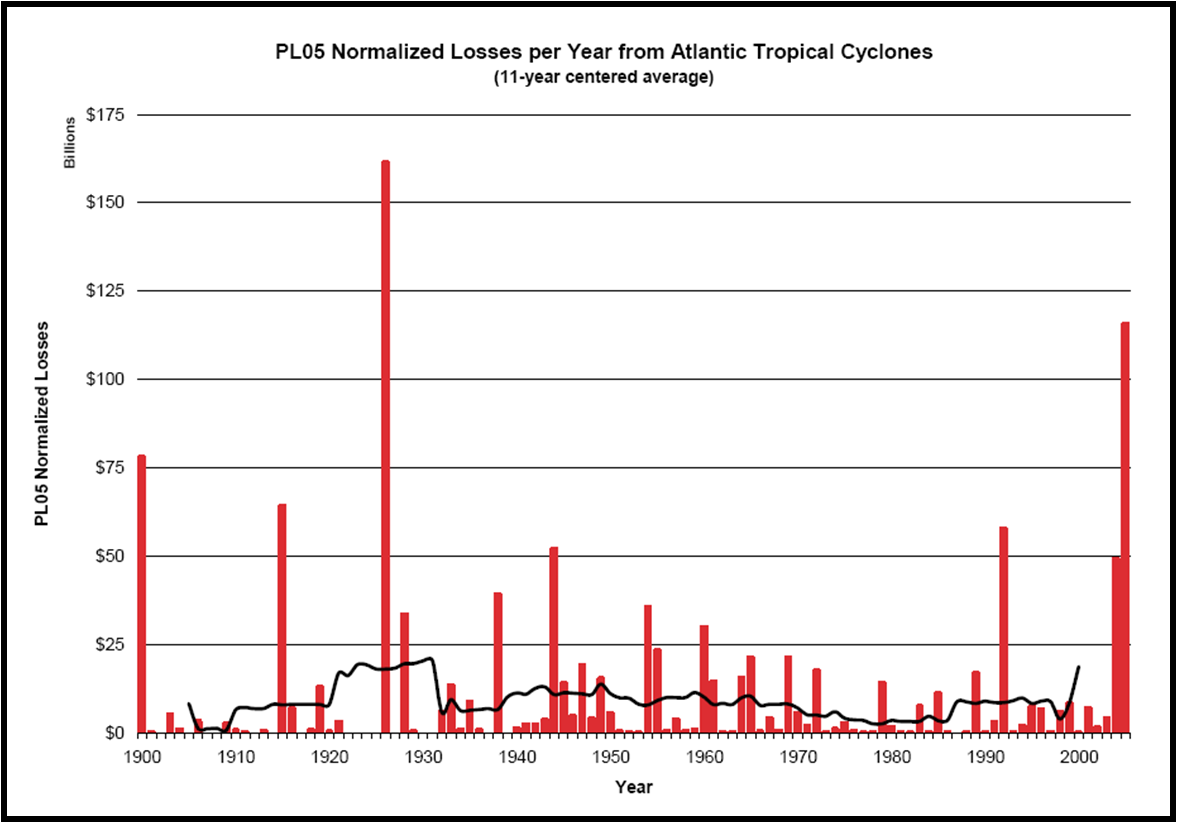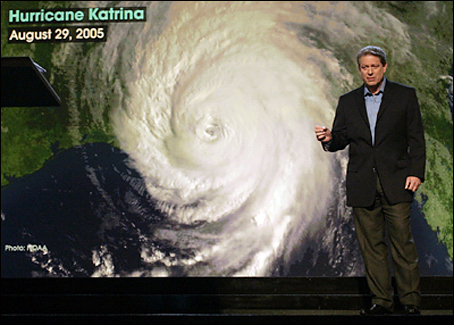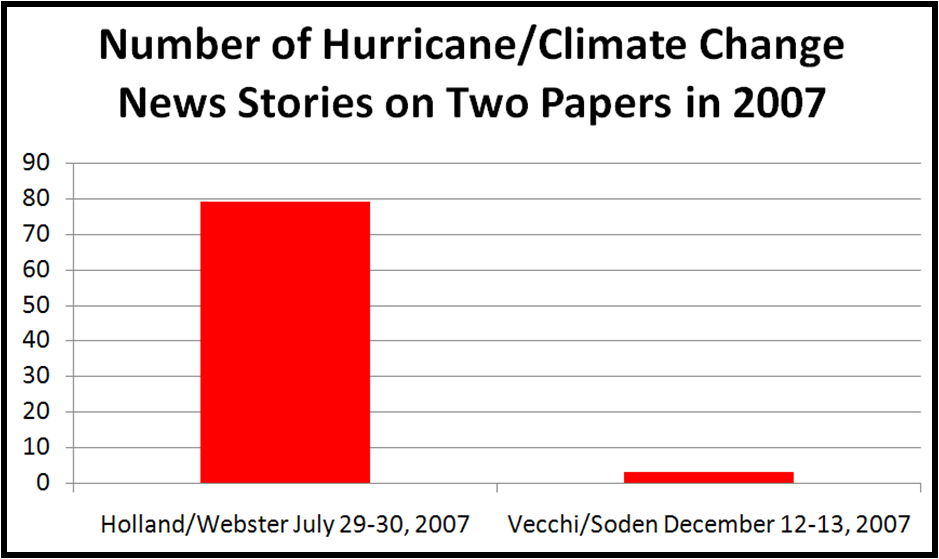Archive for the ‘Disasters’ Category
May 8th, 2008 Posted by: Roger Pielke, Jr.
On NPR’s Fresh Air earlier this week, Al Gore suggests that Typhoon Nargis, which may have killed 100,000 people in Myanmar, is linked to greenhouse gas emissions, or does he? He said “we’re seeing consequences that scientists have long predicted might be associated with continued global warming.”
What could he have meant? If you ask me, I’d say that the “consistent with” chronicles continue . . .
PS. Those wanting to do something positive in the face of this tragedy might visit this site.
Posted in Author: Pielke Jr., R., Climate Change, Disasters, Science + Politics | 2 Comments »
April 16th, 2008 Posted by: Roger Pielke, Jr.
Some wise words from Georgia Tech’s Peter Webster on our ability to predict the future incidence of tropical cyclones (or TCs, which includes hurricanes):
Unless we can explain physically the history of the number and intensity of TCs in the recent past, then determining the number and intensity of TCs in the future will be either an extrapolation of very poor data sets or a belief in incomplete and inexact models.
Posted in Author: Pielke Jr., R., Climate Change, Disasters, Prediction and Forecasting | 1 Comment »
April 11th, 2008 Posted by: Roger Pielke, Jr.
I have always held Kerry Emanuel in high regard, because he calls things like he sees them, but he also listens to others who might not share his views. He is, in short, a great scientist.
So it was not too surprising to see that Kerry’s views have evolved on the issue of hurricanes and climate change, as science has progressed. A Houston Chronicle story reports today the following:
One of the most influential scientists behind the theory that global warming has intensified recent hurricane activity says he will reconsider his stand.
The hurricane expert, Kerry Emanuel of the Massachusetts Institute of Technology, this week unveiled a novel technique for predicting hurricane activity. The new work suggests that, even in a dramatically warming world, hurricane frequency and intensity may not substantially rise during the next two centuries.
The research, appearing in the March issue of Bulletin of the American Meteorological Society, is all the more remarkable coming from Emanuel, a highly visible leader in his field and long an ardent proponent of a link between global warming and much stronger hurricanes.
His changing views could influence other scientists.
“The results surprised me,” Emanuel said of his work, adding that global warming may still play a role in raising the intensity of hurricanes but what that role is remains far from certain.
I emailed Kerry to ask if the story accurately reflected his views. He replied that it was a bit exaggerated, but basically OK. Those engaged in the political debate over climate change who are skeptical of a link between hurricanes and climate change might try to make some hay from this news report. But here at Prometheus we’d suggest viewing Kerry’s evolving view in the much broader context, which we have shared on multiple occasions, namely:
there are good reasons to expect that any conclusive connection between global warming and hurricanes or their impacts will not be made in the near term.
So don’t get to excited about the latest paper in hurricane climatology, the field evolves slowly, and the views of of our best scientists evolve with it.
Posted in Author: Pielke Jr., R., Climate Change, Disasters, Risk & Uncertainty, Science + Politics | 5 Comments »
April 11th, 2008 Posted by: Roger Pielke, Jr.
Anyone who wants to see how the misplaced opposition to adaptation actually hurts poor people need look further than thie report out today from ClimateWire:
Environmental and humanitarian activist groups plan to formally ask the World Bank to back away from plans to create a $500 million trust fund aimed at helping poor nations cope with climate change.
The letter, which representatives of several organizations confirmed Thursday is being drafted and will be signed by more than 100 organizations, comes as the World Bank and International Monetary Fund launch their 2008 spring meeting, attended by finance ministers from across the world.
Among the reasons cited for opposing adaptation funds is that the World Bank is supporting the development of a giant coal plant in India:
Groups said their overarching concern, though, is the World Bank’s fossil fuel-rich energy portfolio. The bank’s approval this week of $450 million for a major coal-fired power plant in India, many said, undermines its attempts to go green.
“There’s a lot of concern about the World Bank taking over of the [adaptation program] because of their ongoing funding of fossil fuel projects,” said Steve Kretzmann, executive director of Oil Change International, a nonprofit group based in Washington that advocates for clean energy and against foreign aid to the international oil industry.
“It is not a credible institution for managing these funds, especially given its poor environmental track record,” added Karen Orenstein, extractive industries campaign coordinator with the environmental nonprofit Friends of the Earth.
“If the World Bank is truly interested in being a leader in fighting climate change, they shouldn’t start out by financing a huge mega-coal project,” she said.
So you read that right, lets take away money that could have positive benefits improving the lives of people in the developing world because of concerns about a fossil fuel project. This is a real-world example of how continuing efforts to place adaptation in opposition to mitigation have a material effect on people’s lives.
Does anyone really think that opposing energy development and adaptation will make the climate agenda more appealing to people in India? Why can’t these groups support adaptation and clean energy at the same time, rather than placing them in opposition?
Posted in Author: Pielke Jr., R., Climate Change, Disasters, Energy Policy | 7 Comments »
January 17th, 2008 Posted by: Roger Pielke, Jr.

Our paper on normalized hurricane damages 1900 to 2005 has now been published. By “normalized” we mean taking damages as recorded in the year that they occurred in that year’s dollars, and adjusting them to account for societal changes such as population growth, building stock, tangible wealth, and inflation. The figure above shows the results of one of the two approaches to normalization presented in our paper.
The full paper can be found at the link below and an Excel dataset can be found here.
Pielke, Jr., R. A., Gratz, J., Landsea, C. W., Collins, D., Saunders, M., and Musulin, R., 2008. Normalized Hurricane Damages in the United States: 1900-2005. Natural Hazards Review, 9:29-42. (PDF)
A few brief comments follow.
(more…)
Posted in Author: Pielke Jr., R., Disasters | 1 Comment »
January 2nd, 2008 Posted by: Roger Pielke, Jr.
Here (in PDF) is an interesting analysis by researchers at Macquarie University in Australia:
The collective evidence reviewed above suggests that social factors – dwelling numbers and values – are the predominant reasons for increasing building losses due to natural disasters in Australia. The role of anthropogenic climate change is not detectable at this time. This being the case, it seems logical approach that in addition to reducing greenhouse gas emissions, equivalent investments be made to reduce society’s vulnerability to current and future climate and climate variability.

We are aware of few policies explicitly developed to help Australian communities adapt to future climate change (Leigh et al., 1998). One positive example is improved wind loading codes introduced in the 1980s as part of a National Building Code of Australia. These codes have been mentioned already and were introduced for all new housing construction following the destruction of Darwin by Tropical Cyclone Tracy in 1974. As a result, dramatic reductions in wind-induced losses were observed following Tropical Cyclones Winifred (1986) and Aivu (1989) (Walker, 1999) and most recently, Larry (2006) (Guy Carpenter, 2006). While these measures were introduced in response to the immediate threat from current climatic events, the benefits will hold true under any future.
An increased threat from bushfires under global climate change is often assumed. However, our analyses suggest that while the prevalence of conditions leading to bushfires is likely to increase, the impact is unlikely to be as dramatic as the combined changes of all of the other factors that have so far failed to materially affect the likelihood of bushfires losses over the last century. This is not to ignore the threat posed by global climate change, but, at least in the case of fire in Australia, the main menace will continue to be the extreme fires. The threat to the most at-risk homes on the bushland-urban interface can only be diminished by improved planning regulations that restrict where and how people build with respect to distance from the forest. Again these are political choices.
Posted in Author: Pielke Jr., R., Climate Change, Disasters | Comments Off
December 26th, 2007 Posted by: Roger Pielke, Jr.
There are a few new papers out on hurricanes (or more generally, tropical cyclones) and global warming that motivate this update.

Before sharing these new papers, let me provide a bit of background.
(more…)
Posted in Author: Pielke Jr., R., Climate Change, Disasters | 2 Comments »
December 17th, 2007 Posted by: Roger Pielke, Jr.
A few weeks ago I provided a midterm evaluation of the RMS 2006-2010 US hurricane damage prediction. RMS (and specifically Steve Jewson) responded and has subsequently (and graciously) sent in a further response to a question that I posed:
Does RMS stand by its spring 2006 forecast that the period 2006-2010 would see total insured losses 40% above the historical average?
The RMS response appears below, and I’ll respond in the comments:
(more…)
Posted in Author: Pielke Jr., R., Disasters, Prediction and Forecasting, Scientific Assessments | 1 Comment »
December 14th, 2007 Posted by: Roger Pielke, Jr.
I’ve generally thought that the media has done a nice job on covering the climate issue over the past 20 years. There are of course leaders and laggards, but overall, I think that the community of journalists has done a nice job on a very tough issue. However, there are times when I am less impressed. Here is one example.

Nature magazine, arguably the leading scientific journal in the world, published a paper this week by two widely-respected scholars — Gabriel Vecchi and Brian Soden — suggesting that global warming may have a minimal effect on hurricanes. Over two days the media — as measured by Google News — published a grand total of 3 news stories on this paper. Now contrast this with a paper published in July in a fairly obscure journal by two other respected scholars — Peter Webster and Greg Holland — suggesting that global warming has a huge effect on hurricanes. That paper resulted in 79 news stories stories over two days.
What accounts for the 26 to 1 ratio in news stories?
Posted in Author: Pielke Jr., R., Climate Change, Disasters, Journalism, Science & Environment, Science + Politics | 11 Comments »
December 10th, 2007 Posted by: Roger Pielke, Jr.
Here is a link to a PPT file providing an overview of a paper by Steve McIntyre and I titled, “Changes in Spatial Distribution of North Atlantic Tropical Cyclones,” which he will be presenting this week at the AGU meeting.
Here are our conclusions:
Spatially descriptive statistics can contribute to analysis of controversial hurricane issues.
There has been no statistically significant increase in cyclone activity in the western Atlantic basin; the entire increase in measured storm and hurricane activity has taken place in the mid-Atlantic;
Lack of trend in landfall and normalized damage reconciles perfectly with lack of trend in western quartile storm and hurricane indices
The eastward shift cannot be attributed merely to earlier detection.
The shift could be technological or climatological or some combination; there is no plausible statistical basis for saying that the shift to the mid-Atlantic is not as important or relevant as the overall increase.
If the trend only occurs in the mid-Atlantic, should policy-makers care?
Comments welcomed.
Posted in Author: Pielke Jr., R., Disasters, Risk & Uncertainty | Comments Off



